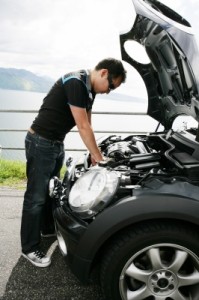Winter is not the only season where you need to pay special attention to your car; the heat, not just the cold, can present harsh conditions that can cause a variety of auto troubles. There is a lot of summer fun to be had with your car, from heading down to the beach to simply taking a nice, scenic drive with your honey. Here are some tips to get your car ready for summer.
Caring For Your Battery
High levels of heat can destroy your battery by causing the fluids to evaporate. Overcharging can also shorten its lifespan. Check your electrical system to ensure it is charging at the right rate; if you have a battery that requires topping off, check it regularly during the summer and add distilled water if necessary. The top should always be clean as dirt can act as a conductor, and drain the battery faster.
Monitoring Your Cooling System
It is hot in the summer, so naturally your cooling system is working hard. To prevent engine meltdown, your coolant should be an even 50-50 mix of coolant and water. Ideally, the fluid should be changed yearly. If you have not done so recently, have the whole system checked. Look for cracks, bulges and frays in the hoses, corrosion and leaks. Have your mechanic perform tests to check the pressure, the thermostat and the cooling fan.
Tending to Your Tires
Tires usually do not get the love they deserve, and are typically the most neglected part of the car. We tend not to give them too much mind until they go completely flat or we have a blowout, and we are forced to get new ones. The summer heat can cause all sorts of tire-related issues. Check your owner’s manual for the recommended tire pressure and check it monthly. You should be getting your tires rotated every 6,000 miles so if you are behind the ball on that one, do it before the summer heat strikes.
Checking the Oil
If you have a newer car that runs a synthetic blend or an oil whose weight is appropriate year round, you probably do not have to worry about this. But, if you have an older car, you should see if you should switch to a heavier weight oil during the summer—this will offer greater protection to the engine, which is very vulnerable to the high temperatures of this season.
Most auto experts recommend changing oil every 3,000 miles, but most owner’s manuals recommend a change every 7,500 miles. Most people do a lot more driving in the summer with family vacations, trips to the beach and the like, so make sure your oil levels and oil quality is good at the start of the season.
Change the Air Filter
During the winter months, your air filter has been gunked up with all sorts of debris, such as salt. Clogged air filters can dramatically decrease fuel efficiency; generally, it is recommended to change it every 12,000 miles. But, if you drive more on roads filled with dirt and gravel, for instance, rather than clean asphalt highways, you might need to change it sooner. The best way to tell is to visually inspect it.
Kelli Cooper is a freelance writer who blogs about a variety of auto topics; she recommends visiting kanetix.ca for more information on car insurance in Canada, including quotes from carriers.
Photo Credit


